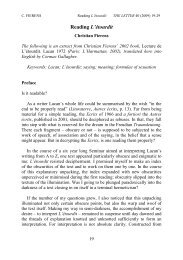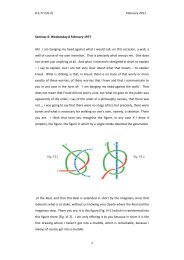a certa<strong>in</strong> way, <strong>in</strong> the Passe, I would not say that for all that he occupies theposition of a passant, <strong>in</strong>sofar as be<strong>in</strong>g placed at the locus of truth at that moment,he is not <strong>in</strong> the right place to say someth<strong>in</strong>g about it. Can we at the same timespeak about this locus, B4-R4, and say this locus?We have already said, if what is proper to this S(Ø) is not to be able to be hidden<strong>in</strong> any moneybox, to return to our metaphor of the possessive analyst, we takeanother step and now we are say<strong>in</strong>g, that as a locus, this locus does not say itselfas such and cannot arrive as such to the jury.Good, I’m go<strong>in</strong>g to illustrate that <strong>in</strong> the follow<strong>in</strong>g way: when you hear a <strong>Lacan</strong>iananalyst, a <strong>Lacan</strong>ian disciple speak<strong>in</strong>g about <strong>Lacan</strong> passant, s<strong>in</strong>ce <strong>Lacan</strong> has def<strong>in</strong>edhimself as not ceas<strong>in</strong>g to pass the Passe, when you hear this passant, can you saythat <strong>in</strong> hear<strong>in</strong>g this passant you understand where <strong>Lacan</strong> is speak<strong>in</strong>g from? Youcannot say so. From where does <strong>Lacan</strong> speak, the S(Ø) of <strong>Lacan</strong>, you can pick outeventually when you hear him or when you read him; when you hear him, I po<strong>in</strong>tout to you here that I am tak<strong>in</strong>g another step, that he always supports himselfwith someth<strong>in</strong>g written. Another example: do you th<strong>in</strong>k that what happened topsychoanalysis, before <strong>Lacan</strong> got <strong>in</strong>volved, is to be imputed uniquely to the factthat analysts of that time were bad Passers or <strong>in</strong>deed that the jury d’agrémentthat they represented, aggregated <strong>in</strong> a way that was not that.The two hypotheses are perhaps true, but not sufficient. If <strong>Lacan</strong> at a given time,rem<strong>in</strong>ded analysts that it would be better to read Freud than to read Fenichel,what was he do<strong>in</strong>g by rem<strong>in</strong>d<strong>in</strong>g them of that, if not that if they really wanted toagree with Freud, they needed a Passer, is, I was go<strong>in</strong>g to say, worthy of thisdef<strong>in</strong>ition, namely, the topological arrangement, the writ<strong>in</strong>g of Freud whichtestifies that Freud does not separate what he says from the locus from which hesays it, and if one wants to br<strong>in</strong>g about, that <strong>in</strong> certa<strong>in</strong> psychoanalytic societies, adumb<strong>in</strong>g down of Freud’s work – you can hear that <strong>in</strong> this dumb<strong>in</strong>g the word vel isbarred, namely, that one no longer hears any more the dimension of ‘Freudparl’être’: what one ends up with is effectively a tak<strong>in</strong>g possession of the theorythat one can put <strong>in</strong> a moneybox.78
What is happen<strong>in</strong>g, is it not, the danger, if the analyst therefore does not makehimself a Passer, namely, if, I may say that the very read<strong>in</strong>g of Freud, of the PasserFreud, qua manifest<strong>in</strong>g his decision, does no longer br<strong>in</strong>g about <strong>in</strong> them an effectof division, namely, this exigency of the S(Ø) which makes one sense that Freud, <strong>in</strong>himself, bears witness to this <strong>in</strong>divisible locus of what he says and which <strong>in</strong> factmakes him the respond<strong>in</strong>g heretic of his word. Because what is proper to awrit<strong>in</strong>g is it not – I am giv<strong>in</strong>g you this last example before conclud<strong>in</strong>g – the properof a writ<strong>in</strong>g whatever it may be is that <strong>in</strong> a writ<strong>in</strong>g the subject of the enunciatedand the subject of enunciat<strong>in</strong>g may well be present, but it is not for all that thatthe writ<strong>in</strong>g will be a Passer: the writ<strong>in</strong>g will only be a Passer if the two ‘I’s’ arearticulated <strong>in</strong> a transmissible way. Take the rather characteristic example of theactor, of the <strong>in</strong>terpreter; a heart-rent <strong>in</strong>terpreter, when he <strong>in</strong>terprets a text, awrit<strong>in</strong>g, it will be heart-rend<strong>in</strong>g for this jury who is the spectator, his tears arego<strong>in</strong>g to draw tears from you and though he says he’s act<strong>in</strong>g, one could say that ifhe cries, if he is overwhelmed somewhere, it is because his enunciat<strong>in</strong>g has beenshaken by the signifiers of the author; <strong>in</strong> such a way that what I am say<strong>in</strong>g to youis that it is not the <strong>in</strong>terpreter who is the Passer of the text, it is the text which isthe Passer of the enunciat<strong>in</strong>g of the actor. I even heard it said <strong>in</strong> the EcoleFreudienne, these are the sorts of th<strong>in</strong>gs that are said, that some Passers thathave been accepted by the jury, if the Passer is accepted, it is because he will havebeen able to give rise <strong>in</strong> his Passer to an enunciat<strong>in</strong>g of the Passer which, for itspart, Passes with the jury and that, s<strong>in</strong>ce it gets Passed, it makes the rest pass,namely, the Passer.I come back to my start<strong>in</strong>g po<strong>in</strong>t to tell you that it is even more complicated thanthat. If the author himself, of whom I am speak<strong>in</strong>g, plays his proper role <strong>in</strong> thefiction that I told you about, that doesn’t prove, if he played his own personage,that he would play the role to perfection, cry<strong>in</strong>g out the truth as one might say –this has happened to great authors like Moliere – that does not prove that, ifchance accepted this fiction, if the chance of life made him encounter the samesituation as the one that he described to his personage, that does not prove thatat that moment he would not be gauche, borrowed; and nevertheless thesignifiers <strong>in</strong> question, it is not a question, as for an actor, of borrowed signifiers, <strong>in</strong>pr<strong>in</strong>ciple they are his own. I come therefore to the idea that the author is not at79
- Page 1:
Seminar 1: Wednesday 16 November 19
- Page 5 and 6:
after all noticed that to consist m
- Page 7 and 8:
It would be enough for you to take
- Page 9 and 10:
There had therefore been a turning
- Page 11:
Supposing that we have a torus in a
- Page 15 and 16:
topology encourages us to do so. Th
- Page 17 and 18:
and me, and I who, in short, by din
- Page 19 and 20:
we cut it in two, the front and the
- Page 21 and 22:
is itself a hole and in a certain w
- Page 23 and 24:
Everyone knows that this is how thi
- Page 25 and 26:
Seminar 3: Wednesday 21 December 19
- Page 27 and 28: proceed to this double cut, a doubl
- Page 29 and 30: The inside and the outside in this
- Page 31 and 32: egards the structure of the body, o
- Page 33 and 34: inspired by it and its inspiration,
- Page 35 and 36: music on you, is that it has this p
- Page 37 and 38: from the beloved to the lover. What
- Page 39 and 40: that the little o-object is not uni
- Page 41 and 42: Seminar 4: Wednesday 11 January 197
- Page 43 and 44: short I called the discourses; the
- Page 45 and 46: It is flattened out, and in a way t
- Page 47 and 48: astonishes me still more, is not th
- Page 49 and 50: Seminar 5: Wednesday 18 January 197
- Page 51 and 52: see it here, namely, something that
- Page 53 and 54: namely, that everything that concer
- Page 55 and 56: Let’s see. Let us try to see here
- Page 57 and 58: - X: You can’t hear me because pr
- Page 59 and 60: Seminar 6: Wednesday 8 February 197
- Page 61 and 62: its relationship to the body that w
- Page 63 and 64: that in the position B1, would be t
- Page 65 and 66: is in the position of maintaining t
- Page 67 and 68: Effectively the problem of primary
- Page 69 and 70: which I will return later, what is
- Page 71 and 72: the object of desire is not unknown
- Page 73 and 74: that he tells the truth. You see th
- Page 75 and 76: look of the Real, there is not, for
- Page 77: accentuated by him is the search fo
- Page 81: grounded and articulatable way, and
- Page 84 and 85: eason is said to be purloined, whil
- Page 86 and 87: Borromean knot with that of the Ima
- Page 88 and 89: Alain Didier Weill, for his part, i
- Page 90 and 91: Seminar 8: Wednesday 8 March 1977Wh
- Page 92 and 93: shouldn’t tell you, at 7.15 at Ju
- Page 94 and 95: means that the tongue fails, that,
- Page 96 and 97: of his time as a formidable cleric
- Page 98 and 99: It is very difficult not to waver o
- Page 100 and 101: I remind you that the place of semb
- Page 102 and 103: this term in the feminine, since th
- Page 104 and 105: which coincides with my experience,
- Page 106 and 107: and to put that for you in black an
- Page 108 and 109: see, does not see too great an inco
- Page 110 and 111: that exists, he says what he believ
- Page 112 and 113: In short, one must all the same rai
- Page 114 and 115: particular besides, neurotic, a sex
- Page 116 and 117: functioning as something else. And
- Page 118 and 119: mean to deny? What can one deny? Th
- Page 120 and 121: slipping from word to word, and thi
- Page 122 and 123: Seminar 12: 17 May 1977People in th
- Page 124 and 125: y writing. And writing only produce
- Page 126 and 127: not pinpointed it? He calls this a














